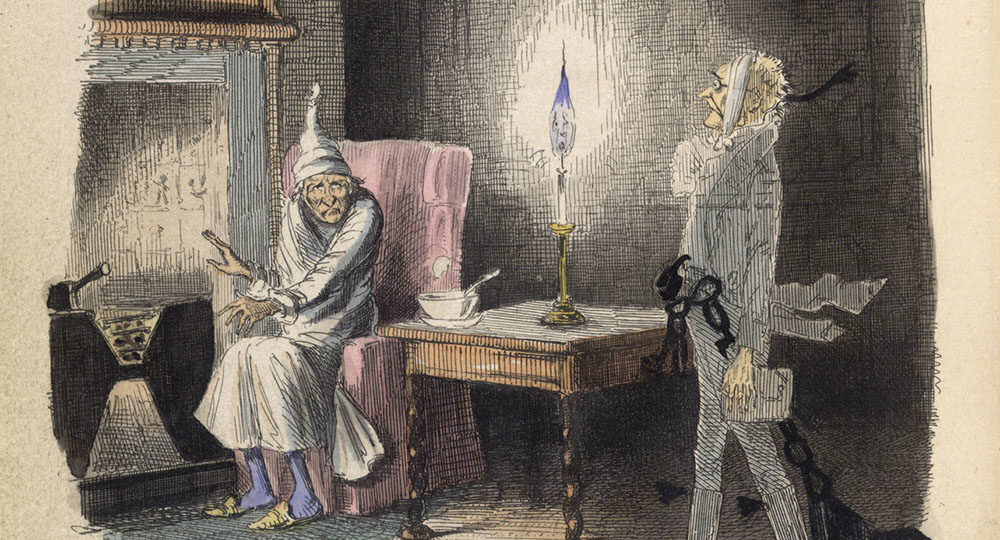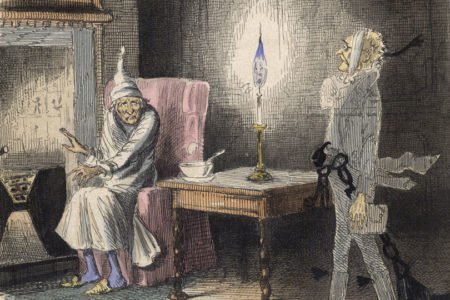Tidings of Comfort and Joy
Scrooge was not happy. “At the first sound of ‘God bless you, merry gentleman! May nothing you dismay!‘ Scrooge seized the ruler with such energy of action that the singer fled in terror.” So wrote Charles Dickens in his classic book A Christmas Carol. The line he quoted came from “God Rest Ye Merry, Gentlemen,” first sung in England around 1827:
God rest ye merry, gentlemen, let nothing you dismay.
Remember Christ our Savior was born on Christmas Day;
To save us all from Satan’s power when we were gone astray.
O tidings of comfort and joy, comfort and joy;
O tidings of comfort and joy.
In the Dickens novel it took the ghosts of Christmas past, present, and future for mean, miserly Ebenezer Scrooge to find the comfort and joy of the season. Scripture teaches that life is filled with trouble, causing some people year-round to display a Scrooge-like disposition (Job 5:7; 14:1). So where is the comfort? Where is the joy? True tidings of comfort and joy are found in the person of Jesus Christ. He alone remains the same yesterday, today, and forever (Heb. 13:8). Jesus said, “These things I have spoken to you, that in Me you may have peace. In the world you will have tribulation; but be of good cheer, I have overcome the world” (Jn. 16:33).
Jesus Christ, Our Yesterday
Jesus’ death on behalf of sinful humanity is a cardinal doctrine of biblical Christianity. It is the entire reason why He came to Earth: “When the fullness of the time had come, God sent forth His Son, born of a woman, born under the law, to redeem those who were under the law” (Gal. 4:4–5). His purpose in coming was to save sinners: “And she will bring forth a Son, and you shall call His name JESUS, for He will save His people from their sins” (Mt. 1:21). The name Jesus is a precious name, and no other is sufficient for eternal salvation (Acts 4:12).
Hard to imagine that our comfort and joy begin with His suffering. But they do. King David foretold the Savior’s death in Psalm 22:
My God, My God, why have You forsaken me? All those who see Me ridicule Me. I am poured out like water, and all My bones are out of joint; My heart is like wax; it has melted within Me. They pierced My hands and My feet….They look and stare at Me. They divide My garments among them, and for My clothing they cast lots (vv. 1, 7, 14, 16–18).
He carried His heavy wooden cross through the narrow streets of Jerusalem. He allowed men to pound iron nails through His wrists and feet as He suffered the physical agony and humiliation described as the most wretched of deaths. Why was He willing? Because His death was the crowning act of God’s manifested love: “For God so loved the world that He gave His only begotten Son, that whoever believes in Him should not perish but have everlasting life” (Jn. 3:16).
The comfort and joy of the season come from intimately knowing the Christ who came “yesterday.” Christ crucified and resurrected is the greatest theme of the universe, and it accomplished the greatest purpose: the salvation of souls. “For I delivered to you first of all that which I also received: that Christ died for our sins according to the Scriptures, and that He was buried, and that He rose again the third day according to the Scriptures” (1 Cor. 15:3–4). In a hymn titled “Jesus, My Hope,” 19th-century evangelist Dr. M. L. Rossvally wrote the following:
The Jewish rites are all fulfilled.
The sacrifice we see.
Our hope alone on Him we build,
Obtained from Calvary’s tree
For you as well as me
Through Christ, salvation’s free.
Jesus Christ, Our Today
A famous orator once was asked to recite Psalm 23, which begins, “The Lᴏʀᴅ is my shepherd; I shall not want.” When he finished, the audience clapped with excitement. Then an old minister was asked to recite the same psalm. He was clumsy and not very polished in his delivery, and his grammar was a bit off. Yet when he finished, there wasn’t a dry eye in the room. People asked themselves, What made the difference? It was the elegant orator who responded: “I know the psalm, but he knows the Shepherd.”
The joy and comfort that Christ provided yesterday is the same today. Perhaps the most famous line of Psalm 23 is verse 4: “Yea, though I walk through the valley of the shadow of death, I will fear no evil; for You are with me; Your rod and Your staff, they comfort me.” In this life there is much suffering and sorrow, disease and death. It is the shadowy valley that God’s children often have to walk through. But Christ, the Great Shepherd, is ever present to give us His peace in this dark and gloomy world. Because “the Lᴏʀᴅ is my shepherd,” we can trust Him to uphold us during trials. His protective presence is there to guide us over the many rocks and stones in our paths, turning them into stepping-stones to strengthen our faith (Ps. 91:11–12).
“For You are with me” (23:4). He did not leave His sheep shepherdless. Before ascending to heaven, Jesus promised to send the Comforter (Jn. 16:7, 13). The Holy Spirit dwells in all believers to guide and lead us. Along with providing eternal salvation, Jesus also gave us the means to live life more abundantly (10:10).
As the Great Shepherd, He rules by His “rod” and supports by His “staff.” This means that God controls all our afflictions and, at the same time, upholds us by His grace. Comfort and joy come in knowing that Christ is always near. He conquers the fears that come in our “todays”:
Fear not, for I am with you; be not dismayed, for I am your God. I will strengthen you, yes, I will help you, I will uphold you with My righteous right hand (Isa. 41:10).
Many Christians do not experience the joy of Christ today because they are stuck between the regrets of yesterday and the fears of tomorrow. Naturally, there will be times when the pathway will be difficult to see. Yet the Lord is on His throne. When God’s plans are not easily understood, hold on to His promises and trust Him:
The Lᴏʀᴅ is my strength and my shield; my heart trusted in Him, and I am helped; therefore my heart greatly rejoices, and with my song I will praise Him (Ps. 28:7).
Jesus Christ, Our Forever
Jesus Christ is the same forever. He preexisted in eternity; and when the time was right, He became incarnate: “Therefore the Lord Himself will give you a sign: Behold, the virgin shall conceive and bear a Son, and shall call His name Immanuel” (Isa. 7:14). The name Immanuel literally means “God with us.” The night before His crucifixion, Jesus prayed, “And now, O Father, glorify Me together with Yourself, with the glory which I had with You before the world was” (Jn. 17:5). He came from glory, and He returned to glory.
For the Lᴏʀᴅ Most High is awesome; He is a great King over all the earth. The earth is the Lᴏʀᴅ’s, and all its fullness, the world and those who dwell therein (Ps. 47:2; 24:1).
Some think the throne of the universe is empty. Wickedness appears to control the world. Lies and falsehood seem to prosper, while truth fades into obscurity. Yet the secret of peace and joy in the midst of a troubled world is the fact that “the Lord God Omnipotent reigns!” (Rev. 19:6).
Despite how things appear, nothing happens that is not under the Lord’s sovereign control. The child that once lay in a lowly manger is now seated at the right hand of God the Father in heaven (Col. 3:1). And believers in Christ are seated with Him and “will reign in life” through Him (Rom. 5:17; Eph. 2:6).
Therefore, we need not fear the future:
God is our refuge and strength, a very present help in trouble. Therefore we will not fear, even though the earth be removed, and though the mountains be carried into the midst of the sea; though its waters roar and be troubled, though the mountains shake with its swelling (Ps. 46:1–3).
What is true about Christ will be true about Christ forever. This blessed hope makes all His promises sure and steadfast and gives us courage and confidence to face our tomorrows.
Apparently, the “good cheer” of the familiar carol in Dickens’s novel only incited contempt in crabby Ebenezer Scrooge. But eventually he experienced the comfort and joy of the season: “‘I will live in the Past, the Present, and the Future!’ Scrooge repeated, as he scrambled out of bed. ‘The Spirits of all Three shall strive within me.’”
Biblical Christians, however, have something infinitely better to embrace: “Happy is he who has the God of Jacob for his help, whose hope is in the Lᴏʀᴅ his God” (Ps. 146:5). Jesus Christ, the author and finisher of our faith—the same yesterday, today, and forever (Heb. 12:2; 13:8).
O tidings of comfort and joy, comfort and joy,
O tidings of comfort and joy.






